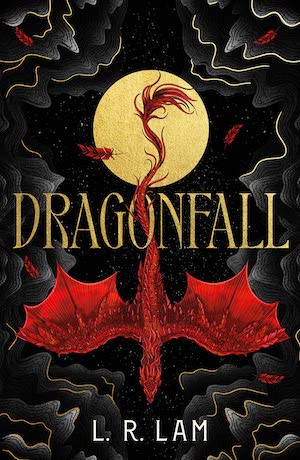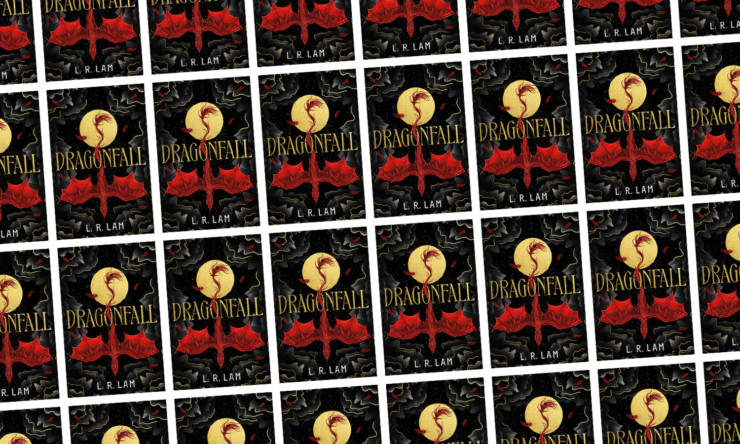L.R. Lam’s previous speculative fiction has appeared under the name Laura Lam, and most recently includes a space opera duology co-authored with Elizabeth May, Seven Devils and Seven Mercies. Dragonfall marks Lam’s first novel-length return to fantasy since Masquerade in 2017. But, true to form, Lam’s hopped subgenres yet again: Dragonfall, the opening volume in the “Dragon Scales” trilogy, straddles the line between caper and epic, and it plays some interesting tricks with narrative and point of view while it’s at it.
Arcady Dalca is an ambitious young person from the city of Vatra, in the country of Loc. They want to go to university, attain an entrée to the highest levels of Lochian government, and prove that their grandfather did not cause the devastating plague for which he was blamed. But as the grandchild to the Plaguebringer, in a country where people are identified by magical seals given at birth, Arcady has no way of doing that in any aboveboard fashion. Their life to date has been that of a thief and an outcast, but they perform a dangerous magic to link themselves to a different seal in an attempt to obscure their identity, so that they can pull off a high-stakes con—stealing a relic of the Vatran gods—and use the proceeds to pursue their true goal.
Fortunately or unfortunately, their dangerous magic has unexpected effects.
Buy the Book


Dragonfall
Everen Emberclaw is a dragon. A young adult of his kind, son of the dragon queen and brother to said queen’s heir, he is also the only male dragon, and possibly the last one. Male dragons are seers, expected to prophesy and help guide their people along the correctly fated paths, but Everen doesn’t have visions, and Vere Celene, his island home, is suffering severe ecological decline. Soon, the eruption of a nearby volcano may render it entirely uninhabitable, and wipe out the dragons entirely. When Everen reads a prophecy that he thinks tells him what he should do, he flies through a rip between worlds—
—and winds up trapped in Vatra, stuck in a weakened, human-like form, and with an incomplete bond to Arcady and faced with baffling, infuriating human culture.
Long ago, you see, humans and dragons lived in the same world. But as the dragons recall it, they were betrayed and exiled without cause. The humans, meanwhile, have all but forgotten dragons as real, present beings: instead, in Loc, they worship dragons as gods, the source of their magic, but remember nothing of human-dragon history.
Everen can save his people if he uses the power of Arcady’s magic to tear open the veil between worlds on the holy day known as the Feast of Flowers, and then to guide them through. In order to do that, though, he must make Arcady trust him—better, love him—and then kill them. One person’s life in exchange for his whole people. It should be a simple trade.
But things are never that simple. As Everen spends time with Arcady, learning both from them and about them, and as, together, they set up the pieces of Arcady’s audacious heist, Everen finds his own emotions engaged. His own affection is developing even as he tries to encourage Arcady to have feelings for him, and that’s both uncomfortable and inconvenient. Arcady doesn’t even know that he’s a dragon, much less that he might need Arcady to die in order to save his people.
The most straightforward description of this novel gives the impression that it follows the conventions of an enemies-to-lovers romance set in an epic frame. That’s slightly misleading: Dragonfall leans as hard if not harder into its epic concerns as it does its personal ones, and while neither are short-changed, readers primarily interested in stories with a romantic emphasis may find this novel does things they don’t expect.
As it turns out, the veil separating Everen’s world from Arcady’s isn’t a simple barrier. Dangerous, inimical things dwell within it, and relics of ancient dragons are what gives certain humans the power to closes the tears that let these dangers through. Rips in the veil have been happening more frequently and more dangerously in recent times. The reader learns this through the eyes of Sorin, an acolyte of the Vatra priesthood who is secretly the agent of (and has been trained to be an assassin for) Magnes, the Vatran high priest who maintains an iron grip on his power and who dispatches other agents to close rips. In particularly vital circumstances, he goes himself. Sorin is an interesting character: a trained assassin who doesn’t want to kill, a young woman who doesn’t recognise (although the narrative does) that while Magnes has in part raised her and cared for her, their relationship is fundamentally unhealthy. He’s an abusive substitute parent, and the narrative indicates that his treatment of her is intentional manipulation, to strategically increase her emotional dependence on and loyalty to him
Magnes also wants the relic that Arcady’s planning to steal. And it’s his job to prevent the consequences of a giant rip in the veil that dragons crossing over would represent. His and Sorin’s imperatives, Arcady’s, and Everen’s, are all on a collision course.
It’s a hell of a ride.
Lam has chosen an interesting way to tell the story, too. Arcady’s sections of the narrative are told from their point of view, in the first person; Everen’s sections of narrative are also in first person perspective, but as though he’s addressing Arcady directly.
It would have been easy to kill you, especially if I had still been in my dragon form. A simple swipe of talons. A snap of teeth.
Meanwhile, Sorin’s part of the story is told in the third person, and the same is true for the other two characters whose perspectives briefly appear.
Lam has written a vivid, energetic fantasy, mixing and matching subgenres to create a striking and appealing novel. Their worldbuilding is interestingly layered, with hints of other secrets yet to be revealed, and their characters are compelling. This is a very enjoyable book, and I look forward to the next instalment.
Dragonfall is published by DAW / Astra.
Liz Bourke is a cranky queer person who reads books. She holds a Ph.D in Classics from Trinity College, Dublin. Her first book, Sleeping With Monsters, a collection of reviews and criticism, was published in 2017 by Aqueduct Press. It was a finalist for the 2018 Locus Awards and was nominated for a 2018 Hugo Award in Best Related Work. She was a finalist for the inaugural 2020 Ignyte Critic Award, and has also been a finalist for the BSFA nonfiction award. She lives in Ireland with an insomniac toddler, her wife, and their two very put-upon cats.










